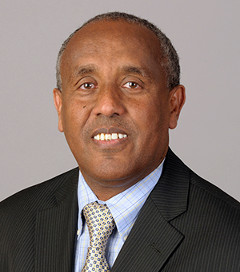Professor
College of Science and TechnologyDepartment of Physics
Marteena 306, Gibbs 302, Lab- IRC 005/07 E: bililign@ncat.edu
Research Activities
Interdisciplinary Laboratory for Air Quality and Climate Research
- Atmospheric Chemistry and Physics/Air Quality Research
The acute levels of indoor and outdoor air pollution in Africa have already become the most significant environmental contributor to premature death, outpacing both malaria and HIV. The persistently dangerous levels of air pollution also degrade the quality of soil and water resources, impeding flora development, reducing food production, and contaminating water surfaces.
In Africa biomass burning (BB) is one of the major sources of aerosols after Saharan dust. Globally BB aerosols make up most primary combustion aerosol emissions with approximately 52% from Africa, these environmental threats will not only impact Africa’s population but will also have a global environmental impact.
In the decades ahead, Africa’s contribution to climate change and air pollution will therefore become increasingly important. If emissions are left unabated, sources of African particulate matter (PM) emissions are expected to contribute 50% to the total global output by 2030. Therefore, there is a need to understand these emissions not just for their effect on the population of Africa, but for the entire world and what they mean to the global climate.
Research in our group uses Spectroscopic techniques for atmospheric applications: The focus is laboratory measurement of optical and physio-chemical properties of biomass burning (BB) aerosol from African fuels.
Laboratory studies are conducted to
- Explore impact of RH, aging, burn condition, morphology fuel type and mixing state on optical and chemical properties.
- Measure emission factors of pollutants from African sources
- Determine the drivers of toxicity in BB emissions
- Model health impacts of biomass burning and trash burning in Africa
The goal is to understand impact of biomass burning emissions on climate and air quality. More at https://www.americanscientist.org/blog/from-the-staff/air-quality-trade-offs
- Air quality in African Megacities
The African population is predicted to be 40% of the world’s population by 2100. Projections show Africa to have the most rapid population growth and urbanization rates globally. Thirteen of the world’s 20 biggest urban areas will be in Africa by 2100.
Motivated by the need for a more comprehensively coordinated research and a sense of renewed interest and attention given to air pollution in Africa our team organized an online workshop in 2021 Air Quality Pilot Study Design in African Megacities - Addis Ababa, Ethiopia
https://cpaess.ucar.edu/meetings/2021/pilot-design-air-quality-africa
And a follow-up workshop in Kigali Rwanda in 2023.
https://cpaess.ucar.edu/meetings/2023/follow-up-pilot-design-air-quality-africa
The Kigali workshop made the following recommendations-
To establish air quality working groups in four East African cities consisting of participants from academic, private and government agencies responsible for air quality monitoring, regulating.
-
To plan a proposal development workshop in Sept. 2023
https://vizuete.web.unc.edu/home/workshop-to-develop-a-proposal-addressing-african-air-quality/
The UNC-CH workshop in September 2023 led to
-
Collaborative proposal with European and East African partners. The proposal if funded is intended to plan a comprehensive ground and airborne based air quality measurements to indefinity the sources and chemical composition of pollutants in the growing East African megacities and provide policy makers with mitigation strategies.
-
Develop courses, degree and certificate program in air quality science and management in East African universities to develop human and infrastructure capacity to support the proposed field campaigns and allow the activity to continue by the local participants.
-
- Environmental and Climate Justice
To accurately predict urban atmospheric composition in a changing climate, we must understand the environmental drivers and climatic impact of the volatile organic compounds (VOCs) emitted from human activity and from trees VOCs. The burden of air pollution and climate change impacts in the US is not evenly shared, with the underrepresented members of the community and poor people impacted the most.- Our team will investigate the links between the effects of changing climate on air quality and urban heat, and the subsequent undue burden on marginalized communities in major cities across NC – Greensboro, Winston Salem, and Charlotte.
- The project involves Community engagement for assessing the impacts on the vulnerable communities, involves engaging local communities in defining metrics for impacts and resilience, and integrating scientific and community understanding. We address environmental equity concerns focused on climate resiliency and the compounding effects of climate changes such as urban air quality and urban heat in the piedmont area of North Carolina. This will be done by addressing environmental justice – fair treatment and meaningful involvement of members of the community – in urban design and mitigating climate change in collaboration with Greensboro city administration and planners by leveraging the Federal Justice40 initiative. It will have substantial benefits for underserved communities and address these issues with a coordinated and holistic approach grounded in the core values of social justice.


